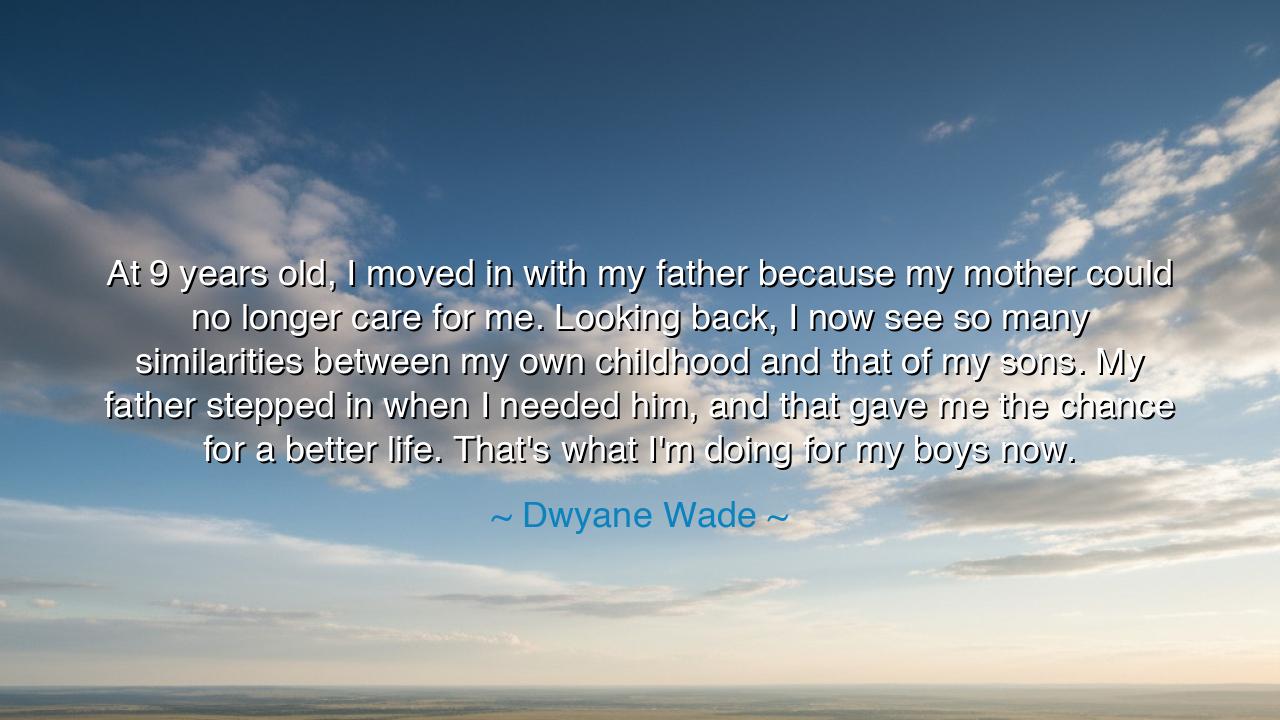
At 9 years old, I moved in with my father because my mother could
At 9 years old, I moved in with my father because my mother could no longer care for me. Looking back, I now see so many similarities between my own childhood and that of my sons. My father stepped in when I needed him, and that gave me the chance for a better life. That's what I'm doing for my boys now.






"At 9 years old, I moved in with my father because my mother could no longer care for me. Looking back, I now see so many similarities between my own childhood and that of my sons. My father stepped in when I needed him, and that gave me the chance for a better life. That's what I'm doing for my boys now." These words from Dwyane Wade are filled with the deep wisdom of one who has walked through the trials of life and is now passing down the lessons learned to the next generation. Wade speaks of the pivotal role that fatherhood played in his own development and his drive to provide the same opportunity for his children. His story is one of resilience, the understanding that parental sacrifice and intervention can be the difference between merely surviving and thriving.
The importance of the father figure in shaping a child’s life is a theme that stretches back through the centuries. Homer’s Iliad, though focused on the lives of warriors, presents the figure of Achilles, who is profoundly affected by his relationship with his father, Peleus. Achilles’ destiny is shaped not just by his own actions but by the guidance and intervention of his father, who, though distant at times, always sought to steer his son toward greatness. Peleus’ influence over Achilles is a reminder that the bond between father and child is not only one of love, but one of responsibility—the father shapes the destiny of his child through guidance and sacrifice. In the same way, Wade’s father’s decision to step in during a time of need became the turning point in Wade’s life, providing him with a new foundation for success.
In more recent history, the role of fathers stepping in during times of crisis has been pivotal. Consider the life of Barack Obama, whose father was absent for much of his early life. While Obama’s mother provided love and nurturing, it was the influence of his grandfather and later fatherly figures that shaped his ambition and understanding of what it meant to lead. Though Obama’s father was absent, his legacy of hard work and the importance of stepping up for family were key aspects of Obama’s growth. Wade’s story mirrors that of many individuals who, in the absence of one parent, find guidance and direction through the intervention of another, shaping their future through sacrifice and dedication to the next generation.
Wade’s reflection on his father stepping in to provide him with a better chance for success underscores the profound power of intervention and personal sacrifice. His father’s action reminds us of the ancient wisdom that the strength of a family lies not in its ability to avoid difficulties but in its willingness to rise to meet the challenges that arise. It was in the hands of his father that Wade found the foundation for a better life, and now Wade, in turn, seeks to do the same for his own children. This cycle of fatherly love and sacrifice is the foundation upon which generations are built, where each succeeding generation rises on the shoulders of those who have given everything to provide opportunity.
The lesson in Wade’s words is one of responsibility and love. The father’s role is not simply that of a provider but of a guide and protector, one who steps in during times of need to help build a better future for his children. Wade’s recognition of the similarities between his own childhood and that of his sons shows the eternal nature of family and the responsibility that each generation carries. It is a reminder that success is not just a result of personal talent, but also the opportunities created by the sacrifices and choices of those who come before us.
In practical terms, Wade’s reflection calls us to take responsibility for those around us, particularly the younger generation. We must not shy away from the burden of responsibility, but embrace the role we can play in shaping the future of those we love. Whether it is through financial support, guidance, or simply being present when needed, we have the power to intervene and provide the opportunity for others to thrive. Wade’s commitment to his sons is a legacy of intervention—a reminder that true success lies not in the achievements we make for ourselves, but in the legacy we build for others through selfless love and sacrifice.
Thus, let us take Wade’s message to heart. Like his father before him, let us be present for those we love, offering guidance, support, and opportunity when the world becomes too difficult. Just as Achilles was shaped by the influence of his father, and Obama found direction through his mentors, so too must we recognize that our actions today will ripple through the generations to come. Let us not shrink from the responsibility of helping to shape the future but embrace it, knowing that in doing so, we create a legacy far more valuable than personal success.






AAdministratorAdministrator
Welcome, honored guests. Please leave a comment, we will respond soon